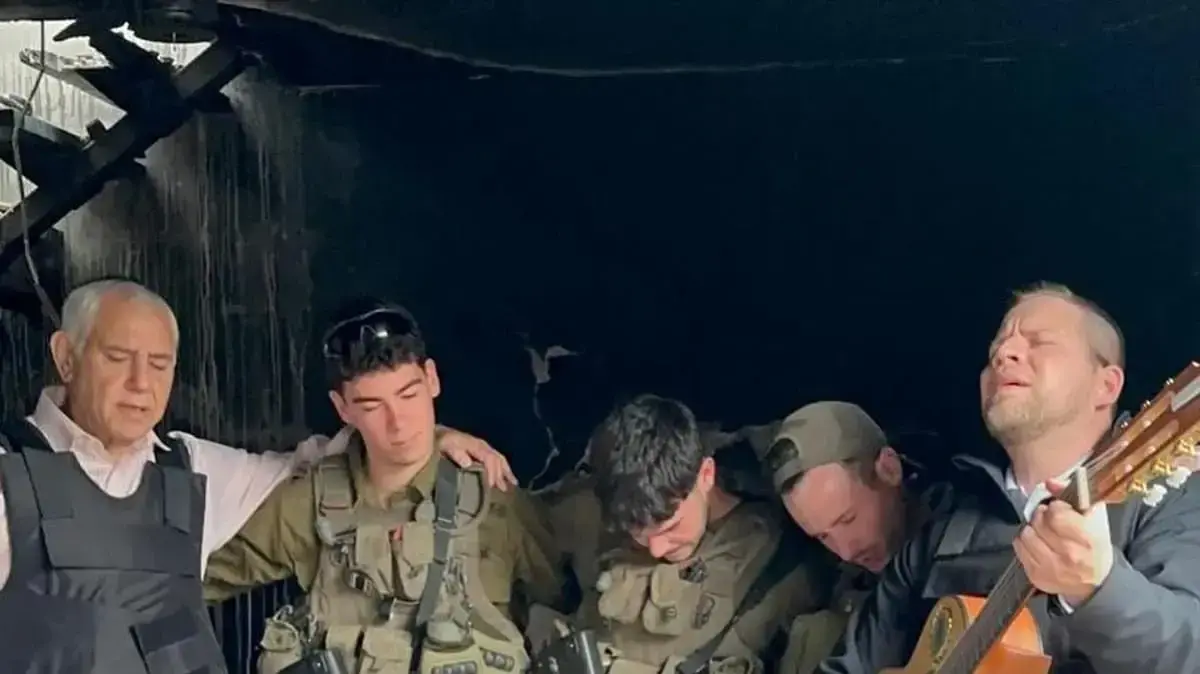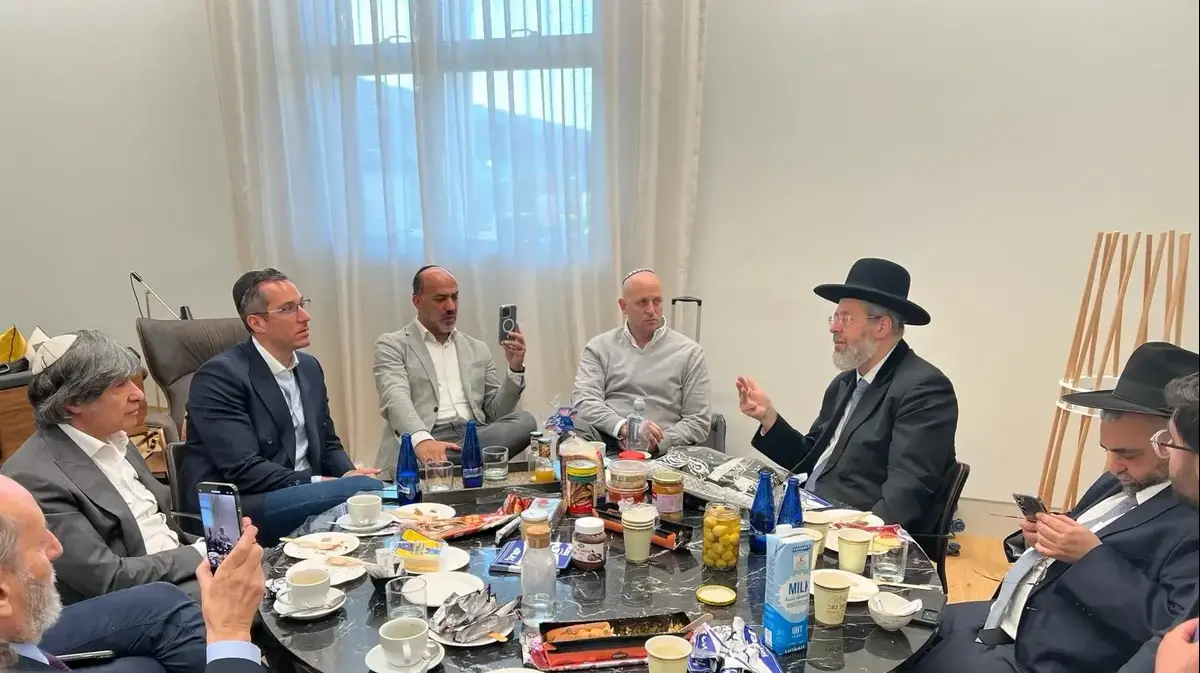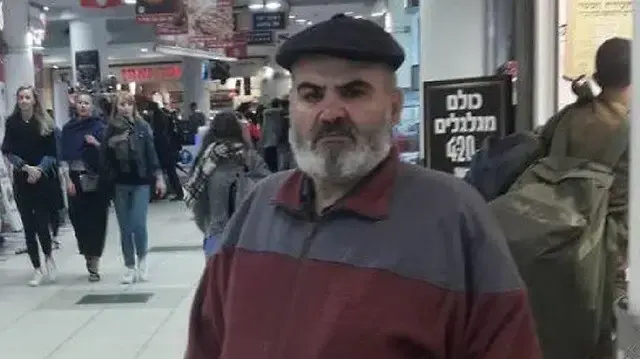Shabbat evening, Shapira neighborhood, Tel Aviv.
In the center of the room is a magnificently arranged table, surrounded by 20 chairs.
Lipaz Ella (32) and Oz Fishman (29) exchange final impressions before the guests arrive for the Shabbat reception they worked hard for.
For a year they have been working to make their dream a reality, and at the end of the evening they will be able to mark another "V" on the way to its fulfillment.
Soon 20 young men and women they don't know will enter the space, into the experience the two have concocted.
Ella and Fishman live in Jaffa.
She is from a Jerusalem Kurdish home, he is half Ashkenazi and half Moroccan who immigrated five years ago from the USA. For years they were on a journey of discovering and exploring their Jewish identity. At some point their paths crossed, and since then they have been paving a new path with the aim of "creating a living and kicking Jewish culture in Tel Aviv". Through the establishment of a physical space in the form of a cafe - or if you like, a new synagogue - which will be called "Minyan".
"I was not close to Judaism at all, I was a rebel," testifies Ella.
"I was brought up in an Oriental home with the values of Judaism, I served in the army for about seven years. When I was released, I went as a messenger of the Jewish Agency to UCLA University, thinking that I was going to bring Israel to the Jewish communities in the Diaspora. In practice, I got my Jewish identity back."
How did it happen?
"I always ask 'why': why do we have to do Kiddush? Why do we read the Haggadah on Passover? When I traveled the furthest away from the Jewish state, to North America, the 'why' became stronger for me. I participated in the Beit Hillel Center on campus (the Jewish Student Organization; traditional, and suddenly I was present in a different cultural climate.
In Israel there are two options: secular or religious.
black or white.
But in the social range there I discovered a variety of colors.
"For example, on Yom Kippur, I suddenly had to ask myself why I do Kippur the way I do it. Is it important to me? After all, I can spend time at the sea, or sit with friends at Starbucks. It was precisely the farthest from home that I realized why Judaism is important to me, and I checked if I could To be a different Judaism. The dichotomy I knew in Israel struck me, and I began to wonder if it was necessary."
Ella and Fishman.
"We want to be able to say that Judaism is also ours,"
"The place where you discovered yourself is where I came from," Elia Fishman responds.
"My grandfather grew up in St. Louis, moved to Israel and attended rabbinical college. His first job was as a messenger for the Beit Hillel Center at UCLA. His best friend is Rabbi Chaim Seidler Feller (former CEO of the Hillel organization; p.s.), but Jewish identity for me has never been taken for granted. It is very different from the Israeli way of being, that being Jewish is the default, it is the framing of life in Israel. According to a 2009 Gutman Center survey examining the Jewish image of Israeli society, 66% of secular young people in Israel define themselves more as 'Israelis' than as 'Jews', and even testify that their interest in Diaspora Judaism is almost non-existent."
The third space
"Even though Tel Aviv wants to be the free city in the world, it fails to allow a rich range of expressions of Judaism," claims Fishman.
"I'm half Ashkenazi, half Moroccan and gay. I grew up in a conservative home with a more reform character. I don't want to go to a reform synagogue, because most of them there are Ashkenazi - and I'm not. And if I go to a 'classic' traditional Moroccan synagogue - I don't necessarily have a place there either , because I can't express my whole self there."
Similar to Fishman, Ella also experienced a clash of identities against the background of the inability of religious frameworks to contain everything and who she is.
One of the examples she shares happened during her studies at the rabbinical college in Jerusalem - where she studied when she returned from the USA. Ella entered a synagogue in the Florentine neighborhood during Torah class, and the men sent her to the women's aid (as expected). In this case, she realized that she could not take an active and equal part in The Jewish world.
"This separation was very difficult for me," she shares, adding: "Towards the end of the lesson, the rabbi asked the students, 'How many prayers are there in the 18th prayer?', so they answered '18.' I shouted '19' from above, and they ignored my answer. Wait. After that, the rabbi explained why there are 19 prayers in the 18th prayer.
When they both think about this space they long for, they rely on the "Third Space" theory.
"Our two main spaces are work and home, and in the past the third space for most people was the synagogue - where they met, rejoiced and celebrated together, etc. Today this space has changed. In Tel Aviv, for example, these are cafes and bars. Our question is how to create a space A third who is also Jewish but also Tel Avivian and free. That's how the idea of 'Minyan' - a cafe that is also a home for creating Jewish culture - was created. A cafe that when you come to it during the day you can work with your laptop, and in the evening it becomes a cultural place for artists who come and sing Judaism, and talk about the Jewish texts. An evening of Gemara and Arak, for example. This space will meet our need for 'both.' Her religion takes center stage," they describe.
Fishman: "Precisely in Tel Aviv, which wants to be the freest city in the world, there is no answer to our desire to express ourselves within the complexity of identity - and within a Jewish framework. I am half Ashkenazi, half Moroccan and gay, and today there is no framework that can accept this complex."
The guests begin to enter the beautiful space.
Until the dream of the cafe becomes a reality, the two have been running a Shabbat meal concept for the past few months, a kind of glimpse of what they know how to produce together.
The guests do not really know where they have arrived yet.
When they were invited, they were told: "Come have a different experience with us on Shabbat evening, together with a group of people you don't know."
The first thing they are required to do is say goodbye to their phones for the next few hours.
"When you enter a new space and try to create new connections, the vulnerability and exposure are very present. This is one of the most sacred things, which almost never happens in this city," says Fishman, "and the fact that there are no phones prevents the escape from this discomfort that everyone experiences."
Is meeting new people related to Jewish identity?
Ella says: "A year ago, the philanthropist Steve Stollman, from the Julius Stollman Foundation for the Promotion of Diverse Judaism, gave us a grant to hold Shabbat meals. He told us that the first time he went to a Shabbat meal in his youth was the first time he felt a connection to Judaism, so he wanted to invest in our idea. Through his donation, and with the help of the 'Institute for Social Momentum', we set off. We realized that this dimension of stopping gives us a lot. It is very easy for many people to connect to this through the world of mindfulness and meditation which is now flourishing. So is our Shabbat dinner: exactly what happens in your family , who tell about the past week and the things we experienced - like that in front of people you don't know."
Jewish mindfulness.
"Rabbi Avraham Joshua Heschel was one of the most significant thinkers in Judaism in the US," continues Fishman.
Because we lived in exile for so many years, there was no space we could hold on to, so we created the traditions.
The crown of this thing is the Sabbath.
This mindfulness - deep breathing, experiencing the moment and giving space to feelings and sensations - is the essence of Shabbat.
you have to stop
There are certain prohibitions that many people interpret as restrictions, but they actually create an infrastructure designed to differentiate between the days of the act and the seventh day."
The sitting circle.
Begin with meditation and focus on the past week, photo: Yehoshua Yosef
"Yom Kippur was at the beginning of my journey in the USA," says Ella. "Rabbi Chaim invited me to study at his home, and I had no idea what it was all about.
I decided to go.
I sat for the first time in front of Jewish texts together with six other students, and I saw in them a lot of wisdom and things that are relevant to me.
At this point I realized I wanted more.
I don't want to be religious, I am a person who celebrates being a Tel Avivian, but I realized that there is something very strong in Judaism that is related to me, and that I need to find out what it is."
Give me an example of such a text.
"Everybody knows the verse from Parkii Avot, 'If I do not have myself, who is mine?', but I did not know the continuation: 'And when I am to myself, what am I? And if not now - when?'. After studying this paragraph I understood who I am. First I need To take care of myself, my 'Maslow'. After that, if I don't take care of my environment - what kind of person am I? And if I don't choose action now - when will I act?".
Ella shares that through this text she redefined her way of life.
For her it was a defining moment, in which she discovered Judaism and the wisdom of the religion.
According to her, "It's not just about keeping mitzvot. When I was growing up, it was called 'from the Bible until 558' - but in practice we didn't deal at all with what happened to the Jewish people in the intervening period. Thousands of years of wisdom and knowledge were absent from my life - philosophy, thought and thought."
"Dealing with texts is one of the most democratic moves that exist in Judaism," says Fishman.
"I and any other person can read a text, give different interpretations and also pass it on to future generations. In my field, for example, as an urban planner, this is one of the most complex issues - how do you take a people who survived on a text, and transfer them to deal with material and space.
"My difficulty here in the city is that we can meet every need: delicious food, spectacular culture. Everything is open. The only thing that is not accessible is the attempt to express ourselves within the complexity of identity - and within a Jewish framework."
Coffee, laptop and scriptures
Back to the coffee shop idea.
I think about how such a space should connect its customers to Judaism.
The two claim that cafes have a great significance in urban existence, because they know how to absorb any type of behavior, and their goal is to bring religion to a place where people feel comfortable.
That is, to a place where everyone can be who they are, with all the identity complexities.
Kiddush at the Shabbat table.
"Dealing with texts is one of the most democratic moves that exist in Judaism,"
Ella says that in addition to this agenda, that cafe will speak Judaism on every possible level - the design, the menu, etc.
According to her, "Part of the cultural wave happening in Israel is that of Jewish renewal, and of the cultural translation of Judaism for 2022. We suddenly see in music artists who refer to Jewish texts - Rif Cohen, Gon Ben Ari and others. Today it is indeed a cafe, but when you enter it - also The art on the walls speaks of Judaism, both the menu and the cultural events that take place in the evening speak of Judaism. This is something that does not exist today in the world.
"I want to massage Rabbi Karlibach in a rap show, and then talk about who he was. This is a completely new cultural creation. I'm not competing with any synagogue or with any house for Jewish renewal (which do amazing work, she points out). I'm competing with the Bhima Theater And with the frequency. I want to be the home of Jewish culture. Judaism is the homes we come from, the traditions we grew up on. 'Tradition' is from the word 'passing', and we hand it on to the next generation - just in a different way."
How does the family react to what you do?
Fishman shares: "Their reactions are the part that moves me the most. My grandfather is a Reform rabbi, and to see him and my grandmother react to these ideas and actions is an amazing thing. They see it as a continuation of their lives as people who were active in the Jewish community in the USA, and to be honest - They are used to a rejuvenating and progressive Judaism.
But for my mother's Moroccan family who live in Kiryat Gat, this is no small thing.
For them it's not a familiar language, and some don't understand when I say 'cafe with a Jewish vibe', but my cousin, for example, was at the last meal we had, and it was amazing to see how she experienced it."
Ella: "It is indeed subversive, and I believe it will create antagonism in some people. I also understand why. We were brought up to guard Judaism fanatically, and I come and say - Rambam was also subversive in his time.
But in the test of time, they changed and created something new.
Subversive today - in the future will be the reality"
I wonder who the Tel Aviv target audience is that the two are aiming at.
I don't remember recently hearing voices on the streets of the city thirsting for more Judaism and tradition.
But for the two - the answer is obvious.
"Our target audience is everyone - people who came from a traditional home and have an affinity for the language, and also people who have antagonism towards religion. We say 'Welcome' to everyone."
Ella adds: "I had no place around the Jewish table, and now I invite you to the new table we are building - and everyone has a place around it."
Something subversive.
"We want to be the next link in this chain that passes on the tradition we create, the one that is based on our life here," Fishman explains.
Ella resolutely answers: "It is indeed very subversive, and I believe it will create antagonism in some people. I also understand why. We were brought up to guard Judaism fanatically, and I come and say - Rambam was also subversive in his time, so was Moshe Mendelssohn, and so was Spinoza.
But in the test of time - they changed and created something new.
What is subversive today will be reality in the future."
Welcome everyone
The guests have arrived, 20 people are already inside, and instead of a phone, they are holding a glass of wine in their hand and are slowly dissipating the understandable embarrassment.
Ella and Fishman are smiling and excited and invite everyone to another room, where cushions are scattered on the floor in a circle.
Now there will be a short meditation, during which the participants will be asked to think about the past week for them.
At the end, they divide into threes - and dive into getting to know each other.
Fishman explains: "We are in Midrash Tanhuma, which says that each person has three names - one given to him by his parents, one given to him by the people, and one he buys for himself. When the guests are divided into threes, each one tells about his house, about the way the environment perceives him and finally - They share what they want to buy for themselves in the world, what they want to give to the environment and society. The most convenient way for us today is to give definitions according to our professional field of activity. But when you meet with a group of strangers, you have to drop it and bring the personal layers in you. Your resume is not interesting right now, but the emotional experience you will go through."
Ella adds: "I'm interested in who you are, not what you are. The reflection on who you are can only happen if you say goodbye to everyday life and return home. That's how we start the evening. Imagine what it's like to be exposed like this to people you don't know. Slowly we Joints are layers of our lives that are not related to the days of the act, but to our being in the world."
How many people really manage to be exposed and open up?
Ella claims that the timing plays in their favor, and that in the days after the Corona, the human infrastructure was already ready for these kinds of experiences.
"After the corona virus, which stopped our lives, many people dived into the question of 'why' - 'why do I do what I do', etc., which made us rethink life here. For us, it's great, because we bring the 'why' to the front of the stage. It's also a matter of age and maturity. People go to self-awareness courses to understand themselves, but we also have that in Judaism, on Shabbat. The last evening we did, it took us almost half an hour to get to the dinner table. People sat and shared the most challenging great that they experience in life, through a Jewish framing of a midrash."
The division into three.
"Sectional joints from life that are not related to the days of the act", photo: Matan Portnoy
"At one meal we talked about the 'Masei' episode, which describes the Jewish people's walk in the desert," says Ella.
"We asked each participant to share an insight into their personal journey. For two hours we sat around the table, and everyone just listened to the journeys that each of them was going through."
Give me an example of such a journey.
"One of the participants shared her journey to preserve fertility, and what it means for her to be single at a relatively late age. She brought the most painful thing in her life to a table full of strangers. There was silence when she spoke, but not out of embarrassment - but out of love and an expression of support."
The word "empathy" takes over my thought, and even before I give it space, Ella interprets it.
"In English they say 'peoplehood' - a feeling of a people, of belonging to the Jewish people. I translate this feeling that I experience around the table to the same feeling that I experience on Yom Kippur in the synagogue, when everyone wears white and prays together. I feel that I belong to the people, which is not only found here. Like That young people go to a Chabad house abroad and feel the Shabbat atmosphere. This is exactly what we are trying to create, the key is in the sense of solidarity. What we are saying is that we are a Jewish people in sovereignty in the Land of Israel, and that we cannot establish our identity only through a sense of sacrifice and loss - As they are expressed on the days of remembrance, for example. We are also together in the good, and in our ability to produce this feeling of solidarity. If it didn't happen around the Shabbat table - it would have received a different framing."
From the seating circle, the guests get up and sit around the table.
Ella and Fishman begin to sing the Shabbat hymns, and it seems that without an iota of embarrassment the 20 guests join them.
Later, one of the participants sings "Shir Lama'at", as is the custom in her house, and everyone surrenders to her voice - their eyes close and smiles appear on their faces.
Fishman: "The presence of Judaism in the Israeli space can be very divisive, and what we discover on our smallest scale is that Judaism can be a unifying force that dissolves borders"
This meal takes place on the last Shabbat evening before Rosh Hashanah, and that is why Ella and Fishman chose to dedicate it to the Shmita year that is about to pass.
They invite the participants to share something that they would like to drop and leave behind, just before welcoming the new year.
One by one, everyone finds their place and shares their hidden thoughts.
"I want to drop my great anxiety for the health of my children," one mother says;
"I want to drop my servitude to the world of work," says another guest;
"I want to drop the feeling of pain that eats me from the inside," a guest who recently lost her father joins the conversation.
How do the guests go out after this Shabbat dinner?
"I think that the presence of Judaism in the Israeli space can be very divisive, and what we discover on our smallest scale is that Judaism can be a connecting force that melts the borders," says Fishman.
"We insist on a composition that is as diverse as possible around the table. By the very act of sitting around it there are contradictions, but this concept requires everyone to engage in what connects, and not in political identity and other things that polarize. This is one of the most magical things we discovered, a lot of people are thirsty for this thing. At the first meal we had no We knew how it would be received, so we were careful, and the biggest feedback was 'we want more Jewish content.'"
The Torah "is not in the sky"
It is interesting to see the translation work these two do for Judaism.
Anyone who would have looked at what was happening from the side would have thought that it was a free evening, or a summit meeting of guys who hadn't seen each other in 20 years, given the palpable intimacy.
But when Alah and Fishman talk about accessibility and the creation of another space - it seems they know the job.
Even when I half-sarcasticly comment on the comparison they make between themselves and the great rabbis and intellectuals in Jewish history - they are not confused, on the contrary.
Ella turns to the Jewish canon.
"'She is not in heaven' is a story that appears in the Gemara, in which Rabbi Elazar and Rabbi Yehoshua debated. The former insisted that a solution to the issue lies in the written Halacha, while the latter said 'She is not in heaven'. In other words, the Torah, although given from heaven, is not beyond the reach of humans , and it is subject to the interpretations of the sages who delve into it. We, humans, need to see how the issue relates to our lives. We should not act only according to what someone wrote hundreds of years ago."
Fishman continues: "If we look at Rabbi Steinsaltz - the translation work he did from the Orthodox world to the secular world is seminal. We feel like heirs of such intellectuals. As innovative as we feel - we are not inventing the wheel. This wisdom exists, and we want to bring it to the audience Another - in the hope that he will later turn it into a new reality.
"The next step is to be able to say that Judaism is also ours. The assumption that the Jewish world, as we know it today, is the only correct thing that has been present since time immemorial - is a mistake. Religion reacted to the changed reality. When in Europe in the late 18th century they accepted the The concept that you can be both Jewish and German - it was revolutionary, and the reverberations of this thing created the ultra-orthodox movement. Judaism, at its core, knows how to be flexible. Today I am both Jewish, also Tel Avivian, both Moroccan and gay - and the list is long, and there is no contradiction between the ranks ".
The excitement in the eyes of the guests is hard to miss.
In the last part of the evening, they divide into pairs, and each one gives their friend a carefully chosen gift that represents something in their life.
They say goodbye, not before a round of hugs, and go back to the phone that was waiting for them on the side.
Tomorrow they will already be part of the "Minyan" community that has been forming in recent months.
After several Shabbat dinners that have already been held, the dream of a "minyant" is taking shape, and now Ella and Fishman are concentrating their efforts on fundraising and looking for partners for the cafe they plan to open (they can be found at minyantlv.com).
"One day there will be a 'Minyan' in every city in Israel and in every big city in the world," they declare.
"Young Jews will choose to be in this space, and they will know that they have the right and the authority to define what their Judaism looks like. This thing is ours, the text exists for us to interpret it. If we do nothing with it - it will die, and therefore it is our duty."
were we wrong
We will fix it!
If you found an error in the article, we would appreciate it if you shared it with us

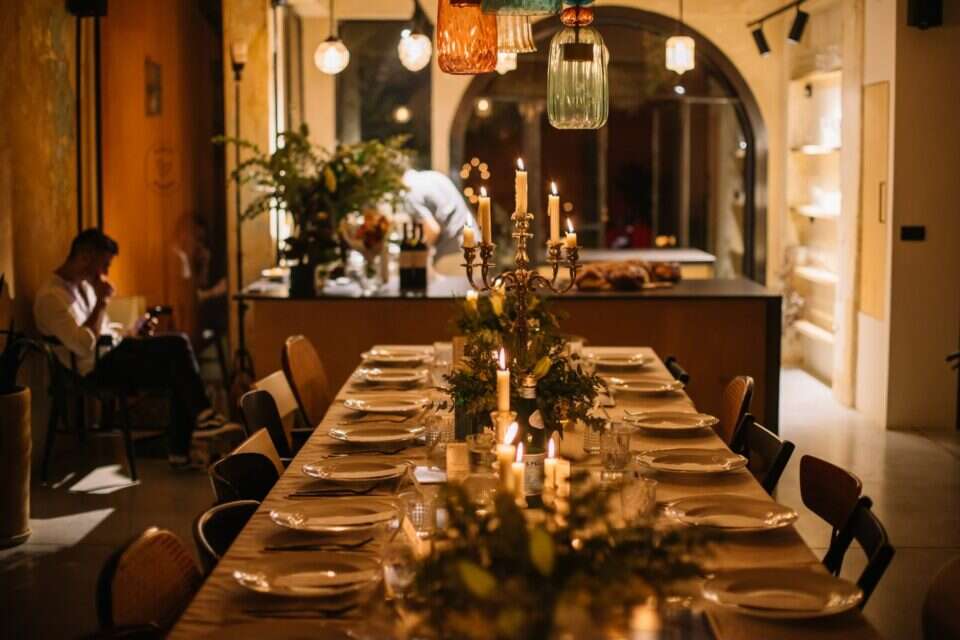
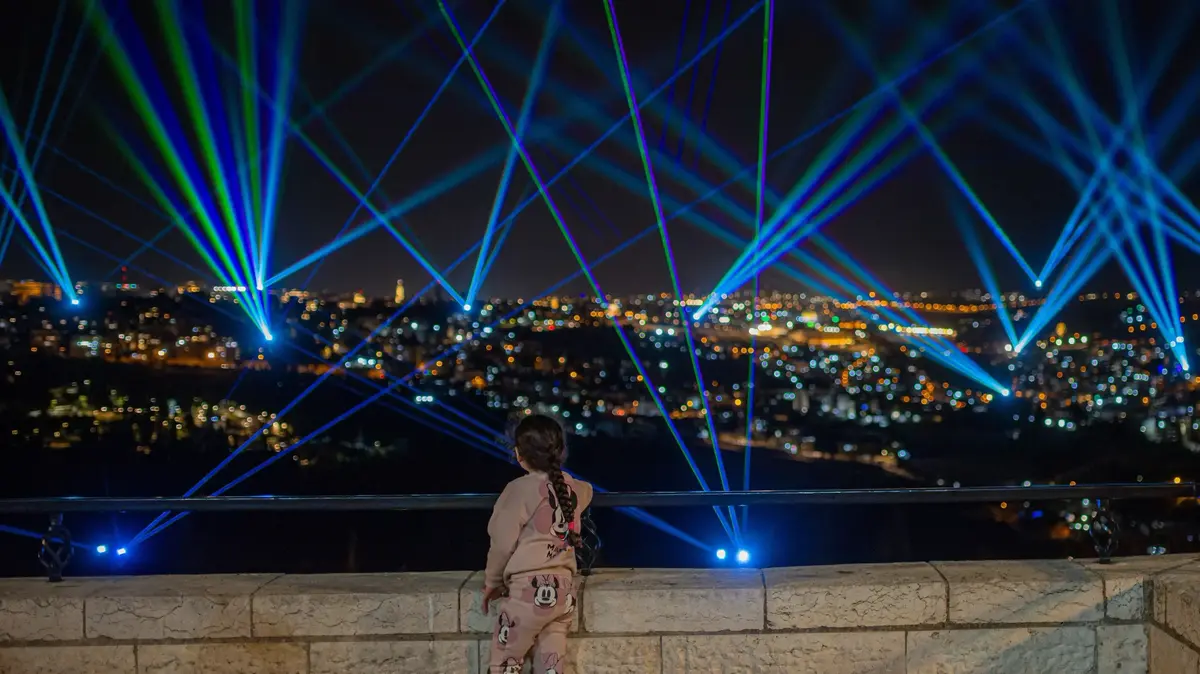
/cloudfront-eu-central-1.images.arcpublishing.com/prisa/VB2FZXRBEFBPNAN5IFP75J6YOM.jpg)



